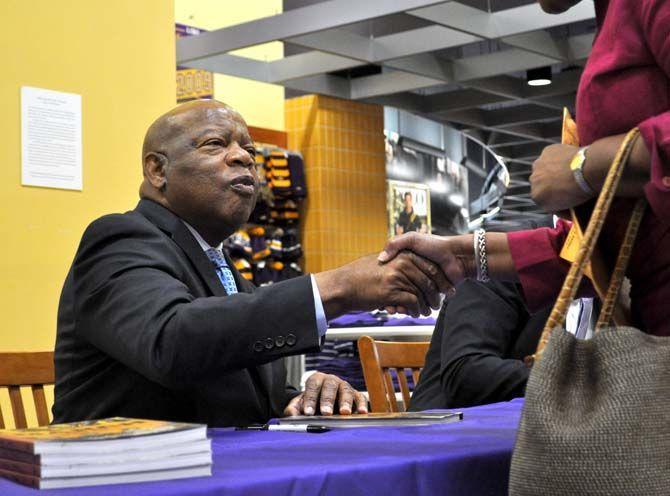Georgia Rep. John Lewis’ march toward achieving nonviolence and racial integration in the 1960s did not stop in Montgomery, Alabama, or in Washington, D.C. — Lewis brought his equality efforts to the University on Tuesday night.
He and Andrew Aydin — co-writer of his award-winning graphic novel, “March” — continued to promote peace by speaking to students and Baton Rouge community members in the Student Union Theater.
Their presentation was part of the University College for Freshman Year’s celebration for its 30th year on campus.
Lewis said he isn’t weary or tired after more than 50 years advocating justice and spending 28 of those as a Georgia congressman.
“It is nonviolence or nonexistence,” Lewis told audience members. “We have come such a distance to create a truly multiracial, multicultural society.”
Lewis said the one thing his parents, grandparents and teachers told him while growing up was to stay out of trouble. However, in his adolescence, he faced physical beatings and arrests more than 40 times — both of which he deemed “necessary” trouble.
“There is power in the way of peace, love and nonviolence,” Lewis said.
He described recognizing this power first when the public library in Troy, Alabama, which denied him a library card, invited him to host a book signing for his book “Walking with the Wind” in 1998, where he was extended a card.
A similar situation proved the strength of ideals inspired by Rosa Parks and Martin Luther King Jr. when a white man who beat Lewis visited his office in Washington, D.C., in February 2009 to ask for forgiveness.
“It was then that we began to live as Dr. King thought we should,” Lewis said. “We called each other ‘brother,’ and we meant it.”
Aydin said Lewis is the solution to teaching nonviolence to the modern generation and that Lewis’ story is the reason he pitched the idea for “March: Book One” and the rest of the trilogy.
“This book is not just a tool,” Aydin said. “In fact, as a French critic put it, it is a weapon — a weapon of mass instruction.”
Aydin said the graphic novel is what this generation needs to spark a revolution because it provides adolescents with heroes other than athletes and celebrities.
“There is a sense of justice and righteousness in this comic book that attempts to free this generation from the heroes that count victories in dollars and introduces them to those that count victory in blood,” Aydin said.
The activism this graphic novel stirs is similar to a 1957 comic book King edited, Aydin said. It plays a different role in the civil rights fight, inspiring global participation via its Spanish and Arabic translations.
Child and family studies junior Bri Dubos said Lewis and his graphic novel excited her, and she didn’t know who Lewis was until she saw him speak.
“I [went] to the event for extra credit for my policy class,” Dubos said. “But I left feeling inspired to live my life to the fullest and take control of my own situations, just like John Lewis did.”
Lewis said people of this generation have a moral obligation, mission and mandate to act upon things they believe in.
“You have to move your feet, move your lips and use your pen to tell your story,” he said. “Don’t give up, don’t give in and don’t be hostile or bitter.”
University alumna Regina Patterson said she’s not giving up against preserving the African-American history. It’s why she attended the John Lewis presentation — he is the only one left of the original Freedom Riders.
“I had never seen him in person, although I grew up in the ’60s,” Patterson said. “I always saw him as just a person on television and read about him in college, so I wanted to experience this.”
Patterson said ending the “history purge” is another part of her cause.
“States are trying to erase history like the Civil Rights Movement — they’re saying ‘that didn’t happen,’” Patterson said. “When I was at LSU, though, I myself experienced segregation.”
People do not realize these events are still happening, and that, she said, is why Lewis’ book was written.
“[Lewis] did this book for the young people who have become passive and self-centered in their nature,” she said. “He did this to further encourage harmonious living and to integrate that into this generation’s cause.”
Ga. congressman rallies students to join ‘march’ for equality
October 21, 2014
Civil rights activist and Congressman John Lewis held a book signing for “March” at Barnes and Noble at LSU on Tuesday.





